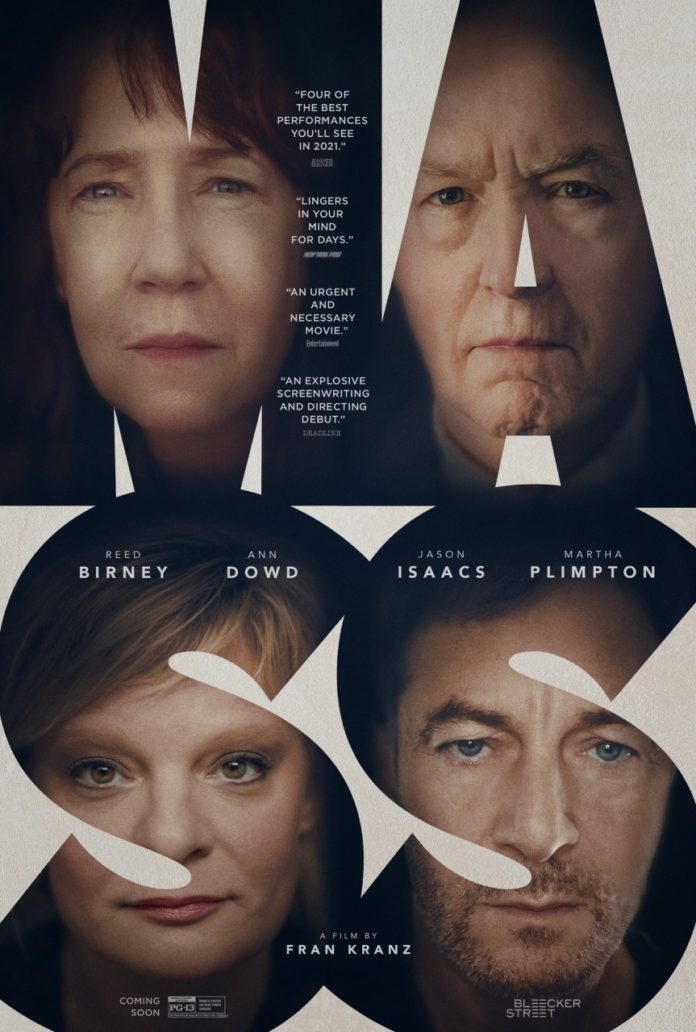Violence, specifically gun violence, has and most likely will always be a major problem in America. Every time you pick up a newspaper, turn on the local news channel or scroll through social media, you’re bound to find a shooting incident that occurred somewhere within the country and sometimes in our very own neighborhoods.
These events are so common that they sometimes don’t even elicit a reaction from the audience. Without fault, there are always tertiary victims who feel the ramifications far after the events occurred and are rarely ever tended to.
This is exactly where “Mass” picks up the pieces. Taking place six years after a tragedy that involved their children, two sets of parents have a meeting for the very first time inside a small room in the basement of an Episcopalian church.
The screenplay sets the scene early on that the meeting that is about to occur will be awkward for all parties. At the beginning, we see a brief of one of the pairs, Jay and Gail (Jason Isaacs and Martha Plimpton), arriving to the church and driving away, thinking that they will not be able to handle whatever discussion will occur inside.
Once both couples are in the same room, there is a strong tension and a sense that whatever brought them here is not yet resolved. Forty minutes pass by until the film finally reveals an explanation for their meeting.
Leaving the audience in suspense for so long is both one of the film’s strongest and weakest points. On one hand, this plot technique can only go on for so long. Only knowing a small percentage about the film’s purpose one-quarter of the way into the runtime can lose viewers’ interest very early on.
On the other hand, this omission of information is brilliant from a screenplay perspective. In essence, the entire film’s premise is clouded in mystery for an extended period of time and leaves the audience asking questions. Why are they here? Who are they? What is the couple’s connection to one another? This mystery also allows for the audience to listen to each individual character without judgement.
And that is exactly what director and screenwriter Fran Kranz asks of his audience. Without knowing which side of the conflict each couple resides on, we are able to see them as humans. Later on in the film we learn that Richard and Linda (Reed Birney and Ann Dowd) were not invited to any of the vigils after the tragedy that tore apart their lives.
It has been six years after the event and they have never been given ample time to grieve. Had the audience known at the start of the film what role their son played in the calamity it may have been easy to pass judgement onto the parents.
A prominent Shakespeare quote says that “the sins of the father are to be laid upon the children.” “Mass” decides to flip the script and ask how the parents are responsible for the actions of their children. Are parents responsible even if they had no stake in the child’s choices? These moral questions are what make the film so captivating, even if the film takes place primarily inside of one room with four characters.
It’s no surprise that Kranz comes from an acting background. Having starred in films such as “The Cabin in the Woods,” Kranz is able to bring out the very best performances from his actors. Watching these actors express so many emotions in such a claustrophobic space is thrilling. Each performance is heartbreaking as more and more information is peeled away like the skin of an onion, leading to a finale that deals a devastating blow.
Rather than provide answers, “Mass” asks questions everyone is afraid to ask.
While it may be frustrating as a viewer feeling as though the nearly two-hour runtime was wasted on one single conversation, “Mass” is a film that stays with you long after the credits roll. The film connects to reality, causing you to reflect on the judgements that you make about others every day.








